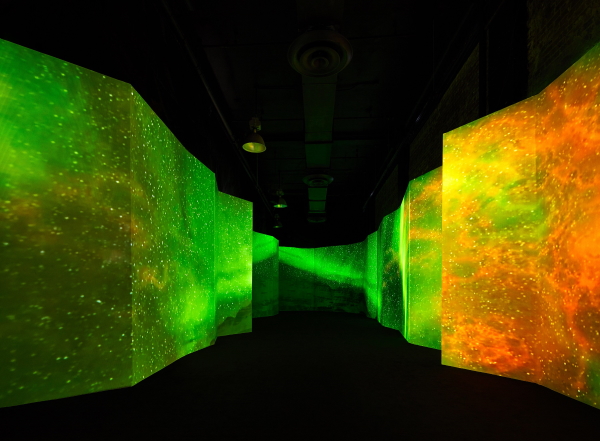[Vogue reports on a temporary immersive art exhibition in New York that uses presence (including via VR and AR) to raise awareness and change behavior regarding the environment. See the original story for more images, Fox 5 for a 1:47 minute video report, and the Arcadia Earth website for more information, many more pictures and a teaser video. –Matthew]

[Image: Credit: David Mitchell / Courtesy of Arcadia Earth]
Enter Arcadia Earth, an Immersive Art World Designed to Inspire Environmental Action
By Natasha Silva-Jelly
August 30, 2019
The Amazon is burning, and fear is igniting worldwide about the future of our planet; inspired by the imminent dangers to the environment, but also the optimism of harnessing everyone’s responsibility for change, one multimedia artist is spreading the message of sustainability through an immersive, visually stunning utopia.
Arcadia Earth has landed in New York City. An 18-room exhibition powered by artificial reality that takes viewers on a mind-bending, multisensory journey, it features underwater worlds, mystical forests, and underground caves, including one made out of 44,000 discarded plastic bags: the number used in New York state every minute. Created to spotlight the biggest environmental threats facing our planet, Arcadia Earth is the creation of Italian-born, New York–based experimental artist Valentino Vettori, who has created retail installations for brands like Vivienne Westwood, Diesel, and Century 21.
Presented in association with Oceanic Global and designed in collaboration with a collective of local environmental artists including Basia Goszczynska, Samuelle Green, and Cindy Roe, this is an exhibition with a purpose. “Arcadia is designed to inspire us to make small lifestyle changes today to protect the future of our planet; every message has an actionable solution. There is no plan B—we must focus on what we can do, and not just continue to have fun in a bubble. We can’t blame our fathers, because they didn’t know. We’re not going to be able to blame our children, because they inherited it. And we can’t sit around waiting for the scientific community to solve this—it’s on us,” says Vettori as he guides me through the experience.
At a time when sustainability is often shelved for not being sexy enough, Vettori has conceived a space that seduces, transporting the viewer into a fantasyland that offers an escape from reality as well as a healthy dose of it. The purpose-built space itself is beautifully absorbing, and the tech aspects are equally thoughtful. At the swipe of my smartphone, I can see sharks, turtles, and all manner of marine creatures—all under threat of extinction—swimming below me. “I’m just here to pass on the information by creating something that is beautiful for a generation that is technology savvy,” says Vettori.
In addition to Arcadia’s augmented reality aspects and project mapping by Meta, which showcases breathtaking naturescapes, ocean imagery, and ecological facts, discover wonders like a room made from the pages of discarded library books, a tsunami of waves created from plastic that washed up on the shores of Long Island, and an oceanic space filled with vibrant plastic-coated jellyfish, which represent the mass of plastic that is predicted to outpace marine life in our oceans by 2050.
“Personally, I feel most connected to the earth installations. We all have a past and a smell, the reminders of our childhood. I spent mine in the mountains with my grandfather mushroom hunting and smelling the grass. I love the ocean rooms too—the sea relaxes you, but the land inspires,” says Vettori, who conceived the Arcadia Earth concept two years ago while at Los Angeles summit the Future of Retail.
“Paul Hawken, the environmentalist and activist, was speaking about his book Drawdown, which offered 200 solutions to reverse global warming, and the room was surprisingly empty. . . . I met Paul and asked him why, and we realized everyone is always talking about climate change in a very negative way. Who wants to hear that we are all going to die? We are going to die anyway—the point is we need to do what we can now and make changes,” says Vettori.
When asked what these changes might be, Vettori easily reels off four suggestions: We need to say no to single-use plastic, eat less meat, waste less food, and shop more responsibly. To inspire guests into action, the exhibition culminates in a “vow room,” where you can make a personal pledge to commit to small lifestyle changes that Vettori believes will have a huge impact.
As for naysayers who might argue that such environmentally minded changes could have a serious negative impact on the economy, that’s exactly the audience he hopes Arcadia will reach.
“We have the power to bring change,” says Vettori. “Soon it’s going to become normal not to have plastic bags or straws. There are so many great sustainable brands and products like Tencel, which is a yarn made completely from trees. . . . Let’s start making money not by polluting, but by doing good.”
Arcadia Earth is showing at 718 Broadway, New York City, until February 2020.
Leave a Reply